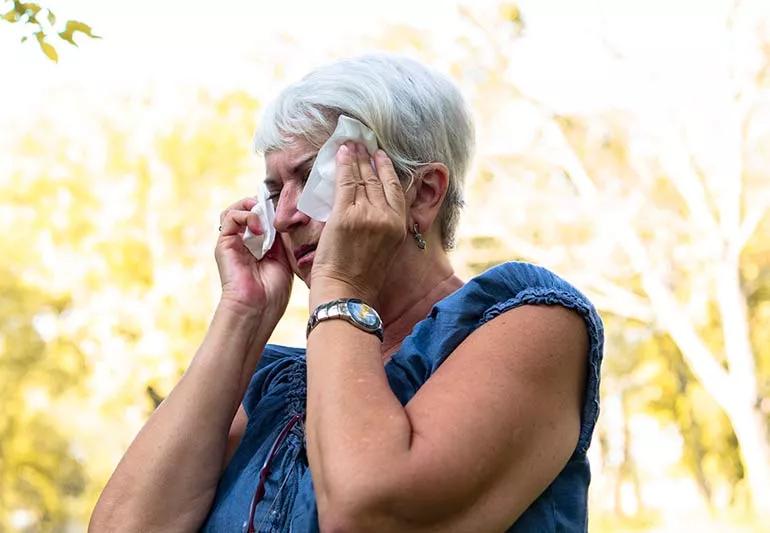A variety of factors, including changes to your body as you age, may lead to new allergies later in life

Image content: This image is available to view online.
View image online (https://assets.clevelandclinic.org/transform/9d4058da-0257-42dd-968f-933b1444df31/adult-allergies-1313655439-770x533_770x533_jpg)
Elderly person suffering from allergies while outside.
Aging can bring a lot of changes to your body — including allergies that seemingly develop overnight. So, don’t be surprised if spring pollen suddenly sets off sneezing fits after never being an issue before.
Advertisement
Cleveland Clinic is a non-profit academic medical center. Advertising on our site helps support our mission. We do not endorse non-Cleveland Clinic products or services. Policy
Why does this happen? We asked allergists Lily Pien, MD, and Dylan Timberlake, MD, to explain what’s going on and what you can do about it.
Most allergies begin in childhood. But it’s not unusual to start reacting to various triggers later in life. Adult-onset allergies are most common in your 30s and 40s. But they can appear at any age.
Multiple factors could drive the development of allergies, including:
Advertisement
In addition, some people are more prone to adult-onset allergies: “If you’ve had eczema or asthma — which both can be allergic conditions — you may be more likely to develop allergies later in life,” notes Dr. Timberlake.
So, what sort of allergies might become an issue for adults? Basically, the same types of allergies we talk about at any time of life, including:
Many allergic reactions occur right away, while others may be a bit more unpredictable or slowly build. Symptoms often depend on what you’re reacting to, but common signs include:
The only way to truly confirm an allergy is through testing. Talk to a healthcare provider about testing if you:
“New allergies may take three to five years to develop,” says Dr. Pien. “So, if you haven’t had an allergy test recently, your provider may want to perform one to help you identify any changes.”
Testing also helps sort out look-alikes — non-allergic conditions that mimic allergy symptoms, like chronic nose sensitivity or reactions to temperature changes. (And knowing you DON’T have allergies can help you get the right treatment for whatever is behind your symptoms.)
Once you know what’s behind your allergy symptoms, you can build a plan to keep them from popping up. Dr. Pien and Dr. Timberlake say there are three main tools:
Advertisement
There’s always a chance your body will outgrow allergies, but those that show up later in life tend to stick around. (Childhood allergies, on the other hand, often fade away.)
“But even if your allergies hang around, there are ways to treat them and deal with them,” reassures Dr. Timberlake. “Start that conversation with your doctor or allergist. We can help you out.”
Advertisement

Sign up for our Health Essentials emails for expert guidance on nutrition, fitness, sleep, skin care and more.
Learn more about our editorial process.
Advertisement
Most antihistamines, like Zyrtec, are OK, but avoid decongestants for at least the first trimester
You can now get lifesaving epinephrine in a nasal spray and prefilled syringes
Drowsiness is a side effect of inflammation, disrupted sleep and, sometimes, your allergy medicine
If you’re sensitive to aspirin or other salicylates, limiting exposure is the best remedy
Mold exposure can cause allergic reactions, asthma and skin rashes
If allergies have you coughing and sniffling all night, try showering before bed, keeping the windows closed and propping your head up
If allergies make your mornings a slog, consider closing the windows and showering at night
When the trees start to bloom, your allergies can come to life — medications, closing the windows and keeping clean can help
Although it could be used as a moisturizer, this new trend is not recommended
Communicating clear limits helps protect your time, energy and emotional well-being
High cholesterol can be genetic, but testing and treatment can lower your heart disease risk